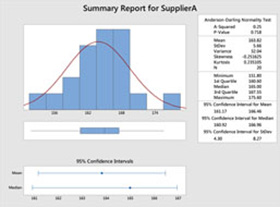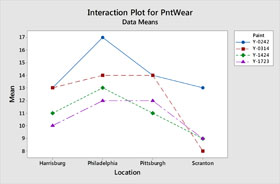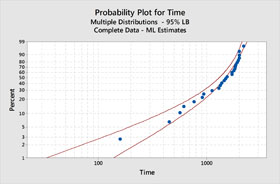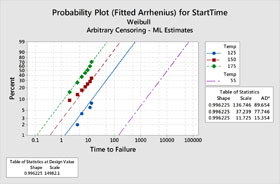Participants will learn data analysis techniques to perform accelerated life tests, determine what factors impact product failure, and make warranty predictions. Analytical and statistical principles will be presented through real-world case studies, examples, and exercises.
This course is most appropriate for reliability engineers, scientists, warranty analysts, process engineers, and other quality professionals who need to understand how a product performs over time.
Training Track
- Minitab Essentials
- Introduction to Reliability
- Advanced Reliability
- Workshop
DAYS 1-2
In this 2-day foundational course you will learn to minimize the time required for data analysis by using Minitab to import data, develop sound statistical approaches to exploring data, create and interpret compelling graphs, and export results. Analyze a variety of real world data sets to learn how to align your applications with the right statistical tool, and interpret statistical output to reveal problems with a process or evidence of an improvement. Learn the fundamentals of important statistical concepts, such as hypothesis testing and confidence intervals, and how to uncover and describe relationships between variables with statistical modeling tools.
This course places a strong emphasis on making sound decisions based upon the practical application of statistical techniques commonly found in manufacturing, engineering, and research and development endeavors.
Topics Include:
- Importing and Formatting Data
- Bar Charts
- Histograms
- Boxplots
- Pareto Charts
- Scatterplots
- Tables and Chi-Square Analysis
- Measures of Location and Variation
- t-Tests
- Proportion Tests
- Tests for Equal Variance
- Power and Sample Size
- Correlation
- Simple Linear and Multiple Regression
- One-Way ANOVA
- Multi-Variable ANOVA


DAY 3
Determine lifetime characteristics of a product using both graphical and quantitative analysis methods. Examine case studies containing censored and uncensored data to learn how to correctly handle a wide variety of data structures commonly found in reliability.
Explore the common distributions used to model failure rates and develop necessary skills in choosing these models.
Topics Include:
- Parametric and Nonparametric Distribution Analysis
- Estimation and Demonstration Test Plans
- Growth Curves
- Multiple Failure Modes
- Warranty Predictions
- Weibayes Analysis

DAY 4
Study and describe the impact that explanatory variables have on product lifetime. Determine the effect of factors and covariates on product failure and the risk of failure to a population of products. Learn how to obtain reliability estimates on highly reliable products in a reasonable amount of time and assess when those components are expected to fail.
Establish appropriate sample sizes and allocation of units to stress levels for an accelerated life test, and determine the effect of a stress variable on the probability of failure. A strong emphasis is placed on using appropriate probability models to predict important lifetime characteristics of your products once in the field.
Topics Include:
- Probit Analysis
- Regression with Life Data
- Accelerated Life Testing and Test Plans

DAY 5 - Optional
Minitab training provides the foundation for improving your efficiency to use statistics to analyze data. The examples present real-world scenarios to learn the tools, while the exercises allow time to practice. Bring your educational journey full circle by reinforcing the training using data from your company. This affords the attendees the opportunity to relate directly to their own use cases.
The workshop places strong emphasis on making sound decisions based upon the practical application of statistical tools to your company projects with your data.
Topics will be determined by the specific customer data brought to the workshop.



